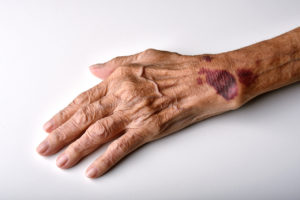
Soft tissue injuries often fail to get the attention that life-threatening injuries like brain injuries or burn injuries receive. But these injuries can result in chronic pain and permanent disabilities.
The soft tissue includes all the tissues of the musculoskeletal system except the bones. Some examples of soft tissue include muscles, tendons, ligaments, fascia, synovial tissue, cartilage, and other connective tissue.
Curious about the causes and effects of a soft tissue injury and the compensation you can seek for them? Read on to learn more.
Table of Contents
How Does a Soft Tissue Injury Happen?

Soft tissue injuries can happen in almost any accident. They can happen when a force pulls the soft tissues beyond their capacity. They can also happen when an object penetrates the soft tissue. They can even happen over time as wear and tear causes damage that accumulates in the soft tissue.
Some common soft tissue injuries include:
Sprains
Ligaments connect bones. They provide stability to the skeleton. Sprains happen when ligaments stretch or tear. Sprains can happen almost anywhere in the body.
In a car accident, the whipping of your head can cause a neck sprain as the force stretches or tears the ligaments of your cervical spine. A slip and fall accident can cause a knee sprain as you stretch or tear the ligaments connecting your thigh to your calf.
Symptoms of sprains include:
- Pain
- Inflammation
- Bruises
- Joint instability
Minor sprains might heal over a few weeks with rest and anti-inflammatory medication. When the ligament tears completely, doctors may need to immobilize the joint with a splint or brace while the ligament heals.
As the ligament heals, you may need physical therapy to build up the strength around the injury to support it.
Doctors rarely treat sprains with surgery.
Strains
Muscles move your body. Tendons anchor muscles to bones. Strains happen when muscles or tendons stretch or tear. Strains can happen anywhere in your musculoskeletal system.
Symptoms of strains include:
- Pain
- Inflammation
- Muscle spasms
- Muscle weakness
- Limited range of motion
Minor strains heal in a few weeks with rest and anti-inflammatory medications. Severe strains could take months to heal.
In some instances, doctors may recommend a brace to support the injured area. You may also need physical therapy to strengthen the muscles near the site of the injury to support your body.
Doctors rarely operate to repair a strain.
Torn Cartilage
Cartilage sits between the bones. It provides a strong but smooth interface so your bones can move without grinding on each other. It also provides cushioning in your joints.
Cartilage can tear under stress or degenerate over time. Symptoms of torn cartilage include:
- Pain
- Inflammation
- Joint stiffness
- Limited range of motion
Rest can relieve some of the symptoms of torn cartilage. Unfortunately, cartilage cannot heal itself. Doctors can implant new cells, but the replacement cartilage cells are usually less flexible than the original cells. This can leave you with chronic pain and permanent loss of motion.
Fascia Injuries
The fascia surrounds your muscles and tendons, where it works to hold the fibers together. When the fascia tears or becomes irritated, you might experience pain and inflammation.
The fascia can tear when muscles and tendons suffer strains. The fascia can become irritated when repetitive stress causes small tears to form in the fascia.
These injuries often heal with rest and anti-inflammatory medication.
Repetitive Stress Injuries
Repetitive stress injuries happen when overuse causes minor damage in the soft tissues to accumulate. The tissue becomes inflamed, causing pain and swelling.
The swelling can lead to complications, such as nerve injuries. When the soft tissue swells, it can pinch nerves. This can lead to numbness, tingling, weakness, and loss of coordination.
Swelling of soft tissue can also cause compartment syndrome. If the swollen tissue pinches off the blood vessels, the tissue will starve. Without treatment, the tissue will eventually die.
What Are the Risk Factors for a Soft Tissue Injury?
Soft tissue injuries can result from any type of trauma or overuse. But some situations have an increased risk of soft tissue injuries. These include:
Car Accidents
Your body can experience extremely powerful forces in a car accident. These forces can tear muscles, tendons, and ligaments. Strains and sprains in the neck, back, and knees are some of the most common soft tissue injuries that individuals experience during a car accident.
Pedestrian and Motorcycle Accidents
Pedestrians and motorcyclists have little protection against soft tissue injuries. Soft tissue can stretch or tear during the initial impact of the vehicle in a pedestrian accident or motorcycle accident. During the secondary impact with the road, the road surface can abrade and tear the soft tissue.
Falls
Falls from a height and slip-and-falls often cause soft tissue injuries. These might include sprains and strains in the:
- Wrists
- Elbows
- Shoulders
- Hips
- Knees
- Ankles
- Neck
- Back
Falls can also tear the cartilage in the knee, elbow, wrist, and ribcage.
Workplace Conditions
Workers can suffer traumatic soft tissue injuries from falling objects, moving vehicles, and slick surfaces. Soft tissue injuries can also occur from repetitive motions in the workplace.
Typing, lifting, walking, and carrying can cause small tears in the soft tissues to accumulate and propagate.
What Compensation Can I Recover for a Soft Tissue Injury?
The compensation for any injury can include your economic losses and your non-economic losses.
Even though a soft tissue injury is usually non-fatal, you might still require extensive treatment, therapy, and medication to regain mobility or to address pain. You could also miss work since most soft tissue injuries require rest to heal. Your compensation should cover your medical bills and lost income.
If you suffer from a permanent disability from your soft tissue injury, your economic losses will also include your diminished earning capacity. If you need to change jobs, work shorter hours, or retire because of your injury, you can claim the income you will lose over the rest of your working life.
You can also seek compensation for your non-economic losses. Non-economic losses include pain, suffering, inconvenience, and lost activities.
Contact a Baltimore Personal Injury Lawyer for Help
Soft tissue injuries almost always cause pain and may prevent you from engaging in the activities you enjoy. These losses will often support a claim for economic and non-economic damages.If you’ve experienced a soft tissue injury in an accident or at work, you shouldn’t have to face the consequences on your own. To discuss the compensation you can seek for your soft tissue injury, contact WGK Personal Injury Lawyers for a free consultation. Our Baltimore personal injury lawyers will explore the details of your case and help you to decide what to do next.


